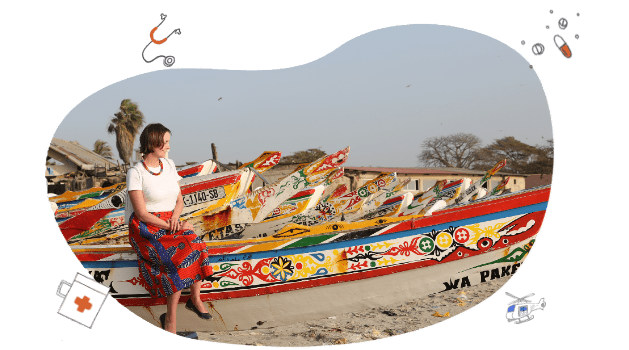

Read all about health insurance in Senegal in our special feature
Senegal, a country of cultural and economic significance in West Africa, faces significant health challenges. Although its healthcare system is more developed than that of many neighboring countries, it still exhibits disparities in access to care and gaps in human resources and healthcare infrastructure, especially outside the capital. For expatriates, international insurance is a must-have. It ensures coverage of healthcare expenses in the private sector (better equipped and of higher quality) and provides essential repatriation assistance coverage in Africa.

| Healthcare expenditure par capita and per year | $ 76.78 |
| Annual indexing of health care expenses | 5.15% |
| CFE hospitalization reimbursement rate | 67% |
| Number of insurance companies available | 15 |
| Cost of hospital coverage for people 30 years old /year | € 672 |
| Cost of hospital coverage for people 50 years old /year | € 1,200 |

Although Senegal may boast a healthcare system that is relatively more developed than many of its African neighbors and universal health insurance, the reality is more complex.
The Senegalese healthcare system faces multiple challenges. Despite a new National Health and Social Development Plan (PNDS) for the period from 2019 to 2028, aimed at ensuring access to "the best possible quality of care" by 2023, the current healthcare system is outdated and plagued with numerous dysfunctions. The government aims to increase the budget allocated to healthcare, but the lack of human resources is a significant drawback. In 2020, according to the Ministry of Health, there were 3,000 doctors in both the public and private sectors combined, representing 1 doctor per 10,000 inhabitants. Cases of medical negligence and deficiencies, particularly in terms of materials and human resources, are regularly reported, as evidenced by the April 2021 fire in a neonatology unit that resulted in the deaths of several newborns.
These issues persist largely due to a generalized lack of human, financial, infrastructural, and equipment resources. It is concerning to note that 67% of operating rooms in healthcare centers are not functional, with 59% lacking equipment, maintenance, and qualified personnel. The increase in chronic and costly diseases in the country, such as cancer, stroke, or diabetes, represents an additional challenge that requires adaptation of healthcare structures and coverage.
Health is a major concern in Senegal, whether it pertains to healthcare provided to individuals, endemic diseases (typhoid fever, HIV/AIDS and STDs, meningitis, hepatitis A and B, etc.), or environmental factors such as insect bites and scorpion stings, or snake or spider bites. It is strongly recommended to stay up-to-date with vaccinations and to adopt appropriate precautions regarding the environment. Specifically, the yellow fever vaccine is mandatory for travelers over one year old, as is the typhoid vaccine for children aged 5 and older.
The quality of healthcare in Senegal exhibits marked differences compared to European standards. The country faces significant regional disparities, with the majority of healthcare professionals and major medical facilities concentrated in Dakar, despite efforts to decentralize healthcare services initiated since 1991.
Depending on your city of residence, access to healthcare can vary considerably, often due to a lack of qualified personnel, with primary contacts being nurses. This is why subscribing to repatriation insurance is essential, as it ensures rapid access to the best healthcare conditions, regardless of your location.
Public hospitals are located in major cities, while private clinics are more widespread throughout Senegal. The public sector is organized into 3 levels:
Level 1: Local health posts, which provide basic first-line care.
Level 2: Health centers and public health facilities (EPS) at the regional level, which provide slightly more specialized care.
Level 3: Hospitals and university hospital centers, which are the referral institutions.
In the private sector, clinics are an alternative to public hospitals, with which they sometimes collaborate (SMNI/FP/PALU project). In rural areas, private facilities are more prevalent than public ones, often becoming the preferred healthcare option for residents seeking more comprehensive care than that provided at local health posts.
However, the quality of care can vary significantly from one clinic to another, with different standards and levels of training. Therefore, it is strongly recommended to seek out reputable institutions to ensure quality medical services. Expatriates mainly choose general hospitals and the private sector based on their geographical location and medical condition. International health insurance providers and the consulate can provide lists of trusted healthcare providers.
In Senegal, you can choose your doctor in the private sector but not in the public sector. Additionally, public hospitals may refuse to provide care if you can afford to pay for your treatment. General practitioners are more accessible than specialists, for whom there is a genuine shortage. Many doctors are trained in Europe and prefer to settle there after their studies, exacerbating the shortage phenomenon.
Regarding hospitalization, fees vary depending on the treatment location (public or private) and the nature of the care. In Senegal, hospital deposit is a specific provision aimed at preventing unpaid bills. For patients, this represents an advance payment whose amount can range from 50,000 to 300,000 FCFA depending on the hospital where you are treated. Insured individuals with IPM and mutual funds may benefit from a deposit advance, while those with expatriate health insurance enjoy 100% coverage of their hospitalization costs.
Here are some examples of fees applied in the public sector in 2023, based on the 3 levels of care:
- Level 1 health post: 500 FCFA for adults and 300 FCFA for children
- General practitioner level 3 (hospital): between 3000 and 6000 FCFA
- Specialist level 3: 10,000 FCFA
- Hospital consultation: 20,000 FCFA
- Hospitalization day: 28,000 FCFA
- Emergency care at the hospital: 700,000 FCFA
- Chronic disease medications: 7500 to 20,000 FCFA per month
- Blood tests: 7500 FCFA for level 1, 10,000 FCFA for level 2, or 15,000 FCFA for level 3
- Normal childbirth: 20,000 FCFA; the CMU provides free coverage for cesarean sections.
Source: cleiss.
In the private sector, fees are generally up to ten times higher and also vary depending on the chosen facility. For example, a consultation can cost between 15,000 and 20,000 FCFA (equivalent to €22 to €30), or even triple depending on the patient's condition. Although these fees remain very affordable compared to Europe, health insurance is recommended for adequate coverage, especially for regular medical needs or for coping with serious or chronic illnesses (such as cancer). Moreover, hospitals redirect many patients to private facilities. For example, out of 2000 dialysis patients, only 700 are cared for in public facilities, where a session already costs between 60,000 and 80,000 FCFA.
Regarding dental care in Senegal, a consultation costs around 6000 FCFA. For more specific treatments, a dental crown can cost an average of 150,000 FCFA, while scaling costs around 20,000 FCFA. Dental care, when occasional, remains accessible to expatriates. Usually, they are covered without the need for health insurance.

When residing abroad, the Caisse des Français de l'Étranger gives you access to a basic level of the French social security coverage for healthcare. European expatriates relocating outside of Europe are eligible for CFE coverage. The health insurance provided by the CFE reimburses various expenses in Senegal, such as medical, surgical, hospital, dental, optical, laboratory, and other treatments, within the limits of the rates and tariffs applied in Zone 1 of the CFE.
However, the CFE functions as a primary reimbursement base and does not cover all of your medical expenses. This limitation is less restrictive for a country like Senegal, where the reimbursement base for hospitalization is 67% of the bill amount, and 65% for pharmacy bills (which can be capped at the rate applied in France). For example, out-of-pocket expenses are at least 33% for hospitalization costs and 35% for pharmacy expenses.
Depending on your needs and financial means, you have several options: pay all your expenses locally, subscribe to local insurance with its limitations, opt for CFE coverage alone with the resulting out-of-pocket expenses, take out complementary insurance with the CFE, or a first-euro contract. Expatriate insurance in addition to the CFE (or first euro) guarantees full coverage for hospitalization expenses, regardless of the healthcare facility, and provides additional reimbursement for your routine expenses, especially for those seeking good reimbursement in the private sector.
The CFE contribution is calculated based on your age and the number of people to be covered (individual or family). The CFE provides coverage internationally for its MondExpat members and facilitates the reopening of CPAM rights upon permanent return to France. Please note that the CFE does not offer repatriation assistance (except for individuals under 30 years old).
In Senegal, the National Social Security Fund (CNSS) provides various social benefits, including family allowances, retirement pensions, as well as maternity and disability benefits. These benefits are funded by contributions from salaried workers and employers, which are determined based on income and industry sectors. The CNSS does not provide unemployment benefits, and family benefits are intended for employees, unmarried female employees, widows, incapacitated individuals, and the unemployed. Finally, employees are mandatory covered for illness and occupational risks.
In 2013, the Ministry of Labor reformed the Mandatory Health Insurance (AMO), introducing the Universal Health Coverage (CMU). The CMU provides basic healthcare coverage to low-income individuals, who can benefit from the same care as those affiliated with other social security schemes, such as the IPM of employees. Its implementation may vary from one region to another.
The IPMs, or Health Insurance Institutes, allow companies to provide mandatory health coverage for their employees. Companies with more than 300 employees must establish their IPM, while companies with fewer employees must join inter-company IPMs or adhere to an existing IPM. Companies can also offer a complementary health insurance plan in addition to the basic scheme, but this does not exempt them from joining the IPM.
The contribution rates for health insurance range from 2% to 7.5% for both the employer and the employee, up to a limit of 250,000 FCFA per month. 2% of these contributions are allocated to AMO. Additionally, since 2017, students must mandatory join the CMU, costing 4,500 FCFA per year. Only 1,000 FCFA are borne by the family.
Independent workers are not eligible, but they can voluntarily subscribe to coverage for work-related accidents and illness, similar to employees, and sign up to supplementary health insurance.
Retired Senegalese individuals receiving pensions from IPRES benefit from free healthcare at IPRES medical centers and affiliated hospitals. Meanwhile, individuals over 60 years old without pensions (through the Sesame plan), children under 5 years old, and vulnerable individuals benefit from Medical Assistance, which provides certain healthcare services free of charge.
The Universal Health Coverage (CMU) faces challenges of financial delays, overly limited benefits, and a poor understanding of the mutual principle.
Health coverage provided by IPMs ensures partial coverage of healthcare expenses, ranging from 50% to 80% of medical costs. It does not cover expenses for dental prosthetics, orthopedic devices, physiotherapy sessions, and expensive radiology procedures (MRI).
Family members of the employee also benefit from this coverage, and each of them has their own health booklet. It is important to note that this health coverage is not immediate, with a waiting period of 2 months, and it generally does not cover chronic illnesses. IPMs may provide hospitalization deposits and a small allowance in case of hospitalization. The major drawbacks of this system include issues related to corruption, a limited number of accredited private facilities, and incomplete coverage of healthcare expenses (medications are poorly covered).
Self-employed workers, as well as voluntary insured individuals, agricultural workers, students, and recipients of the Family Security Allowance, can subscribe to private health insurance. These plans cover all family members after a waiting period of 1 month. The coverage is slightly more comprehensive than that provided by IPMs, with a reimbursement rate of 80% for expenses incurred at public facilities and for medications. In private facilities, medications are covered up to 50%. However, beneficiaries of scholarships are covered at 100%.
The number of insurance providers varies by location. For example, in Dakar, there are approximately 86 registered insurance providers, while there are 90 in Thiès and 41 in Kaolack.
Local health insurance schemes have limitations, including their limited geographical coverage within Senegal, partial coverage in public or private facilities and networks, and incomplete range of services. Moreover, even if certain treatments are covered, there are often additional expenses that remain the patient's responsibility. For instance, while the consultation fee may be covered in public facilities, ancillary costs associated with the consultation may be subject to a technical fee.
In this context, an expatriate health insurance policy can address many of these limitations, offering more comprehensive and less restrictive coverage than local health insurance schemes.


While healthcare expenses in Senegal are affordable for most, it's important to consider certain local realities. The country has a public healthcare sector (unevenly distributed across the territory), coupled with mandatory health insurance for employees and universal health coverage for the most disadvantaged. However, in practice, this system has many limitations, and expatriates often turn to the private sector. This reliance on private healthcare can be costly in the long run, and the procedures related to payment guarantees in case of hospitalization can be cumbersome.
In this context, subscribing to expatriate health insurance in Senegal has many advantages:
Flexibility of coverage: You benefit from flexible and comprehensive coverage for all medical expenses that matter to you. Hospitalization coverage for 100% of expenses in healthcare facilities of your choice. Coverage for routine medical expenses not limited to consultation fees, including physiotherapy, nursing care, pharmacy expenses, and even advanced examinations such as MRIs and CT scans. Additional coverage for optical and dental care, alternative medicine, or maternity care, according to your needs.
Direct payment of hospitalization expenses: To avoid the constraints of deposits and advance payments, without imposed networks.
International coverage: Allowing you to be covered in France for treatments you prefer to undergo during occasional returns, or in case of repatriation for serious medical issues. And extending worldwide coverage for your business or personal travels.
Repatriation assistance: Or minimal medical evacuation, to overcome potential limitations of the local medical infrastructure and ensure your safety.
Practical services: Access to services such as teleconsultation or second medical opinion, which are particularly important in countries with fewer healthcare facilities, quality of care, and medical personnel training.
Contract security: With French expatriate health insurance companies in particular, which offer lifelong coverage (without time limits), do not exclude chronic illnesses, and cannot individually revise your pricing conditions.
Simplified management: With the ability to submit reimbursement requests online or via a mobile application.
Choosing expatriate health insurance is a wise decision for your safety and peace of mind. Plans can be adapted to the level of healthcare expenses in the country (with coverage for medical care at 80% or 90%, for example) and can fit into all budgets.
Signing up for an expatriate insurance for Senegal can be done at any time, whether it's before departure or once you're already there. International insurance offers flexibility, allowing you to select your coverage options and reimbursement levels based on your needs and healthcare habits. The coverage provided is similar to what you're familiar with, eliminating uncertainties related to local operations.
However, it's recommended to subscribe at least 30 days before your departure, as the procedures for international health insurance enrollment are more complex than those for a regular health plan. When subscribing upon arrival, waiting periods may apply, whether it's for the CFE (from 3 to 6 months) or for healthcare or optical-dental coverage in expatriate contracts. Planning in advance for your health insurance subscription when possible can offer certain advantages.
During the enrollment process for expatriate insurance, additional management delays may be generated by the review of the health questionnaire, which is customary for all expatriate insurers. Depending on your medical history, exchanges with the medical service may be necessary, and you may be asked to provide additional medical documents (always keep your medical records accessible). You may also be required to have a doctor who follows you for a particular condition complete a questionnaire.
On our website, you can perform online simulations to get quotes and compare coverage options, helping you make an informed decision.
Our advisors are available to refine your options and answer all your questions, as well as to assist you in finalizing your choice and guiding you through the enrollment process. Our international health advisors are experts in your destination.
If you contribute as a salaried worker or self-employed voluntary insured, you have access to the public sector and its negotiated rates, or to local insurance. However, public facilities tend to frequently redirect patients who can afford it to private healthcare facilities, the CMU only caters to the most needy, and the guarantees of local insurances may be too limited.
In Senegal, it is highly recommended to subscribe to expatriate insurance covering hospitalization and repatriation, given the limitations of healthcare in the country and the reliance on the private sector. The reasons why repatriation insurance is essential are detailed in the following section. As a reminder, the hospitalization guarantee of international insurance allows you to benefit from 100% direct coverage of your hospitalization, regardless of the chosen hospital, thus freeing you from any constraints of deposit or advance payment.
Ideally, select a plan that also covers routine medical expenses. To control your healthcare budget, prioritize a reimbursement base of 80% for these expenses, which is often sufficient. The optical-dental guarantee is not as important, as dental care remains accessible in Senegal; it is often preferable to pay for this type of bill out of pocket.
Finally, if you have a pregnancy project in the short or medium term, it is essential to subscribe to maternity coverage from the start, as maternity waiting periods are generally 9 to 12 months long. And it is important to know that no insurer covers ongoing pregnancies, including the CFE. Finally, it is always important to consider that birth delivery costs in case of complications or neonatal care can be extremely expensive, which could further complicate an already difficult medical situation.
Senegal is a destination where repatriation assistance is essential! It guarantees transportation to the most suitable hospital or transfer to an appropriate medical facility, including in the home country, when the local facilities are not sufficient. Moreover, repatriation can be extremely expensive and represent a considerable financial risk if you were to bear the costs yourself.
Indeed, the cost of a medical repatriation depends on several factors, including the place of care, the means of transport used, and the level of medical care required. Without insurance, medical repatriation can cost between €10,000 and €40,000, or even more! For example, the repatriation by medical plane from Senegal to France of a retiree severely affected by dengue fever cost €50,000.
Repatriation assistance also offers "comfort" services that are particularly useful in difficult situations. This can include paying for the travel of a relative who would come to your bedside, organizing childcare or transferring your children, or repatriating the body in case of death. The latter can cost between €2,000 and €5,000, depending on various factors such as location, type of coffin, and funeral care provided to the deceased.
In the event of a medical emergency, neither your embassy nor your consulate is responsible for organizing or covering the cost of medical repatriation. If you do not wish to pay the bill alone (which can reach tens of thousands of euros), hospitalization with repatriation assistance is the minimum recommended for any traveler to Senegal.